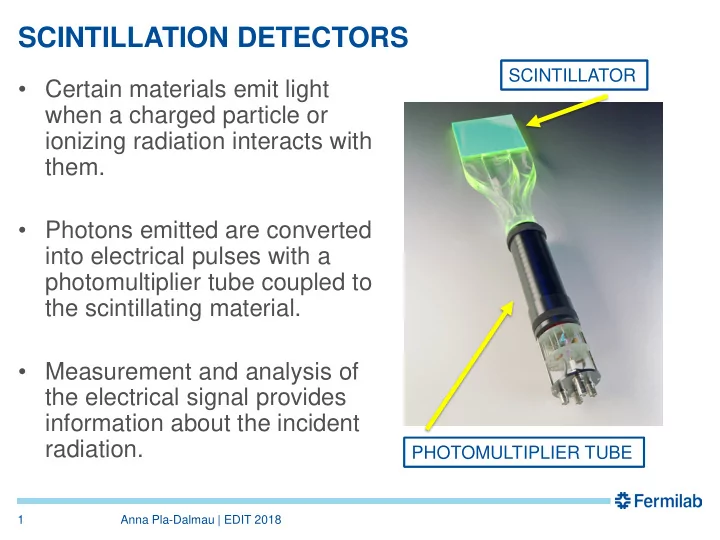

SCINTILLATION DETECTORS SCINTILLATOR • Certain materials emit light when a charged particle or ionizing radiation interacts with them. • Photons emitted are converted into electrical pulses with a photomultiplier tube coupled to the scintillating material. • Measurement and analysis of the electrical signal provides information about the incident radiation. PHOTOMULTIPLIER TUBE 1 Anna Pla-Dalmau | EDIT 2018
SCINTILLATION DETECTORS • Liquids, gases, solids – Solids – crystals, glasses, plastics – My favorite PLASTICS EXTRUDED EXTRUDED CAST 2 Anna Pla-Dalmau | EDIT 2018
PLASTIC SCINTILLATION DETECTORS • PLASTIC: polystyrene (PS) poly(vinyltoluene) (PVT) • COLOR: First additive emits light in the deep blue. – Its light is not seen. Second additive shifts this light produced to longer wavelengths. 3 Anna Pla-Dalmau | EDIT 2018
PLASTIC SCINTILLATOR MECHANISM • Energy transfer from the ionizing radiation to the polymer matrix resulting in the excitation of the polymer molecules. • Energy transfer from the polymer excited states to the primary dopant through Forster mechanism. • Energy transfer between primary and secondary dopants through emission and reabsorption of a photon. 4 Anna Pla-Dalmau | EDIT 2018
PLASTIC SCINTILLATOR MECHANISM A E POLYSTYRENE E A PRIMARY DOPANT Forster SECONDARY DOPANT A E photon 250 320 350 420 nm 5 Anna Pla-Dalmau | EDIT 2018
STANDARD COMPOSITION BLUE SCINTILLATOR CORE • Polystyrene: Dow Styron 665 W • Dopants: 1% PPO + 0.03% POPOP WHITE CAPSTOCKING – ONLY EXTRUDED SCINTILLATOR • Polystyrene with 15% TiO 2 – 0.25 mm thick READOUT WITH A GREEN FIBER • Y11 fiber – 175 ppm K-27 – 1.2 mm diameter, multiclad 6 Anna Pla-Dalmau | EDIT 2018
Recommend
More recommend